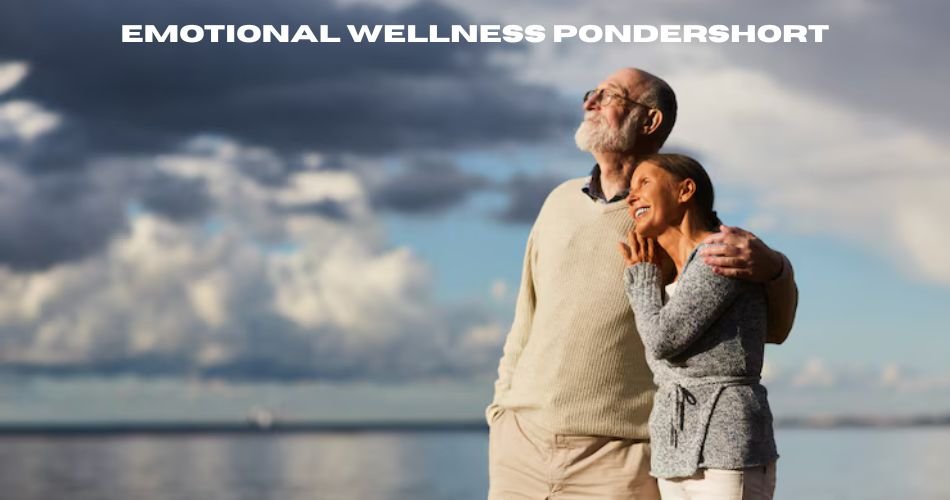Emotional wellness pondershort is a simple yet powerful concept that encourages brief moments of reflection to nurture your emotional health. In today’s fast-paced world, taking short pauses to check in with your feelings can make a significant difference in managing stress and building resilience. This practice helps you stay connected to your emotions without becoming overwhelmed by them. By incorporating emotional wellness pondershort into daily life, you create a foundation for mental clarity and balanced responses. In this article, we will explore how this mindful habit can transform your emotional well-being for the better.
What Is Emotional Wellness Pondershort?
The term “Pondershort” might sound unfamiliar at first, but it’s a concept that resonates deeply with those seeking quick, effective emotional self-care. Emotional wellness pondershort refers to taking short, intentional moments throughout your day to pause and assess your emotional state. Think of it as a mini emotional check-in—an opportunity to observe what you’re feeling without judgment. Unlike lengthy meditation sessions or extended therapy, pondershort is designed to be brief yet impactful. It encourages mindfulness and self-awareness in everyday life, helping prevent emotional build-up that can lead to stress or burnout. This brief reflection becomes a powerful habit, creating space for emotional clarity amidst the chaos of daily routines.
The Importance of Emotional Wellness in Our Daily Lives
Emotional wellness plays a critical role in how we interact with the world around us. When our emotions are balanced and well-managed, we can make clearer decisions, communicate more effectively, and handle stress without feeling overwhelmed. It affects our physical health too—unaddressed emotional distress can manifest as headaches, fatigue, or even chronic illnesses. On the flip side, nurturing emotional wellness leads to better sleep, improved immune function, and an overall sense of well-being. Emotional wellness isn’t a luxury or a niche interest; it’s a necessity for leading a fulfilling life. By integrating small moments of emotional reflection, like pondershort, you give yourself the gift of ongoing emotional health that supports every other area of your life.
Key Components of Emotional Wellness
Understanding emotional wellness means breaking it down into actionable parts that we can recognize and develop. The first key element is self-awareness—the ability to tune into your feelings and identify them accurately. Without self-awareness, emotions can feel like an unpredictable storm. Next comes emotional regulation, which is the skill of managing how you react to emotions, especially challenging ones like anger, anxiety, or sadness. Emotional regulation doesn’t mean ignoring feelings but responding thoughtfully rather than impulsively. Lastly, resilience is essential—it’s your emotional strength that helps you recover from setbacks. Like a muscle, resilience grows stronger the more you practice handling emotional difficulties constructively.
Common Emotional Challenges People Face
Almost everyone faces emotional challenges at some point, but these can vary widely from person to person. Stress from work or relationships, feelings of loneliness, grief from loss, and anxiety about the future are common struggles. Sometimes these emotions become persistent, clouding your perspective and making it difficult to function at your best. Without proper care, minor emotional difficulties can snowball into serious mental health issues like depression or chronic anxiety. Recognizing these emotional struggles early—and responding with care—is crucial. This is where emotional wellness pondershort can act as a preventative measure, encouraging you to pause and address your feelings before they escalate.
How Emotional Wellness Pondershort Supports Mental Health
The power of pondershort lies in its simplicity and accessibility. By setting aside even a few moments daily to check in with your emotional state, you foster a habit of mindfulness that enhances your mental health. This practice slows down the mental rush, allowing you to notice subtle emotional shifts that might otherwise go unnoticed. For example, recognizing rising anxiety early in the day allows you to apply calming techniques before it spirals out of control. Pondershort creates a mental space to process feelings, which reduces emotional overwhelm and increases your capacity to cope with life’s challenges. It’s a tool that empowers you to stay emotionally grounded without needing hours of dedicated practice.
Techniques to Enhance Emotional Wellness Pondershort
There are several techniques you can use during your emotional wellness pondershort to deepen the experience and make it more effective. Mindfulness meditation is a great starting point. By focusing on your breath or bodily sensations, you center yourself and reduce racing thoughts. Another technique is journaling—writing down what you feel helps clarify your emotions and release pent-up stress. If journaling isn’t your style, try positive self-talk, where you consciously replace negative or critical inner dialogue with kind, encouraging statements. These simple techniques help transform the brief pondershort moments into meaningful emotional resets.
The Role of Social Connections in Emotional Wellness
No one is an island, especially when it comes to emotional health. Strong, supportive relationships serve as vital emotional anchors. Sharing your feelings with trusted friends or family members can provide relief, new perspectives, and a sense of belonging. Social support buffers the impact of stress and promotes positive emotions, which in turn enhance emotional resilience. During your pondershort reflections, consider how your social connections influence your emotions and what you might do to nurture these relationships. Even a quick text or a friendly conversation can significantly boost your emotional wellness.
The Link Between Emotional Wellness and Physical Health
You might be surprised how closely intertwined emotional wellness and physical health really are. Chronic stress and unresolved emotional turmoil can lead to physical symptoms such as tension headaches, muscle pain, digestive problems, and a weakened immune system. Conversely, physical ailments often contribute to emotional distress, creating a vicious cycle. By maintaining emotional wellness through daily practices like pondershort, you not only improve your mood but also protect your body from the harmful effects of stress. Emotional self-care, therefore, should be seen as an integral part of overall health care.
Recognizing Emotional Imbalance Early
One of the biggest benefits of practicing emotional wellness pondershort is developing the ability to spot emotional imbalance early. Symptoms such as persistent sadness, irritability, loss of interest in activities, changes in sleep or appetite, and social withdrawal are signals your emotional well-being needs attention. By regularly pausing to reflect, you become more attuned to these warning signs, allowing you to intervene early with self-care strategies or professional help if needed. Early recognition prevents minor emotional issues from growing into severe problems that can disrupt your life.
Daily Habits to Maintain Emotional Wellness
Sustaining emotional wellness requires consistent care. Building daily habits around your emotional health can create a strong foundation. Besides pondershort moments, activities like regular physical exercise, healthy eating, sufficient sleep, and time in nature are powerful contributors to emotional balance. Also, practicing gratitude, limiting exposure to negative news, and setting boundaries with technology help preserve your emotional energy. Small, intentional actions add up, creating a ripple effect that enhances your mood and resilience over time.
Technology’s Impact on Emotional Wellness
Technology is a double-edged sword when it comes to emotional wellness. On one hand, it offers tools like meditation apps, online therapy, and social connection. On the other hand, constant notifications, social media pressures, and information overload can increase anxiety and distract from emotional self-care. Managing your technology use with intention—such as scheduling breaks, muting unnecessary alerts, and curating your digital environment—protects your emotional space. Incorporating mindful technology habits into your pondershort reflections can help you find a healthier balance.
Adapting Emotional Wellness Pondershort for Different Life Stages
Emotional needs evolve as we age, and so should our wellness practices. Children and teens may need more guidance in identifying emotions, while adults often juggle complex stressors like work and family. Seniors may face loneliness or grief. The beauty of pondershort is its flexibility; it can be tailored to suit any age group’s pace and style. For example, children might use simple breathing exercises or drawing during pondershort, while adults might prefer journaling or guided meditation. Adjusting these moments to fit developmental stages ensures emotional wellness is accessible and effective for everyone.
When and Why to Seek Professional Help
While emotional wellness pondershort is a fantastic self-care tool, there are times when professional help is necessary. If emotions feel overwhelming, persistent, or interfere with daily life, therapy or counseling can provide deeper support. Professionals offer strategies and interventions that complement your personal efforts, helping you work through trauma, depression, anxiety, or other mental health conditions. Remember, seeking help is a sign of strength, not weakness, and enhances your emotional wellness journey.
Conclusion
Emotional wellness is the heart of a balanced, fulfilling life. It empowers you to face challenges with strength, enjoy relationships more deeply, and appreciate each moment. The concept of emotional wellness pondershort offers a practical, manageable way to nurture your emotional health amid a busy lifestyle. By dedicating brief moments to pause, reflect, and recalibrate your feelings, you build a foundation for resilience and joy. Start today—give yourself permission to check in, listen, and care for your emotions. Your mind and heart will thank you.






